Every pharmacy and big box store seems to boast their own unique line of generic over-the-counter drugs and remedies these days. It’s impossible to miss these products since they’re often placed right next to their big brand name brothers on store shelves.
But are these generic drugs worth it?
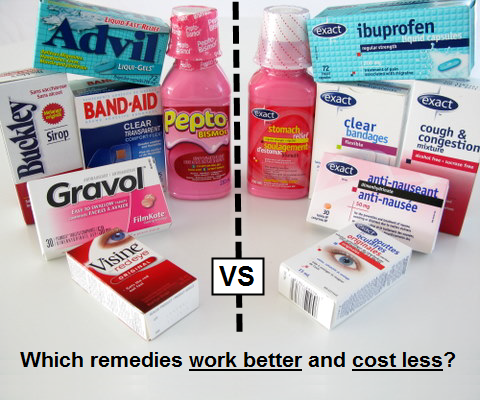
Sure, the packaging looks similar, the ingredients look consistent, and the price looks good — but how much do you really save? And do these generic drugs and over-the-counter remedies work as well as their cheaper counterparts?
Being a curious creature with a bad headache, a slight cough, and a touch of sea sickness-induced nausea (yeah, don’t go boating in October without a proper hat), I decided to take a bunch of commonly used brand name and generic remedies for a spin. Yes, this is a human guinea pig and price check experiment! Cough. Wheeze. Spew.
Price Check Rules
It never fails. Whenever I do a price check post (See Is Costco really worth it?) I get a rash of email from around the globe (that’s planet Earth, people) asking me to compare costs at some local store near whoknowswhere. The problem is: I don’t live near whoknowswhere! So I want YOU to take my simple price check experiment rules and apply them to where YOU live. It’s like teaching the internets to fish, but far less smelly.
OK, so the rules for buying generic over-the-counter drugs and remedies are simple — follow them and you can’t (cough) go wrong.
THE ONE RULE: Always compare brand name and generic labels to make sure you’re getting an equivalent product. Sooo…
- Check dosage.
- Compare active medicinal ingredients.
- Compare inactive ingredients (sugar, starch, etc.).
- Verify product volumes, weights, or sizes are equivalent.
- Check Cost (sometimes the brand is cheaper on sale).
- Size up if the larger volume is a better value.
- Check expiry dates.
Easy peasy!
Are generic drugs the same as brand name drugs?
I checked in with the big federal health authorities in Canada and the United States for their take on generic over-the-counter drugs, medications, and remedies. Turns out that generic drugs not only have to be approved for use in both countries, but they must be exactly the same as the brand name in terms of active ingredients, strength, dosage form, route of administration, and labeling.
The U.S. Food and Drug Administration (FDA) website says:
[The] FDA firmly believes that generic drug products that have gone through the approval process can be used with the full expectation that consumers will receive the same benefits from generics as they do from brand name equivalents.
In Canada, non-medicinal ingredients in generic products can be different from those in the original brand. The Health Canada website says:
Normally, when manufacturers change the non-medicinal ingredients or the manufacturing conditions, they have to provide studies to prove that the effectiveness of the drug has not changed.
So given that generic medications must be medicinally equivalent to the better known brand name product, my little experiment is sticking to price, sight, and taste comparisons.
Sample Shopping List
There’s must be a kagillion different types of generic drug brands available on the market today. Walmart, CVS, Shoppers Drug Mart, London Drugs, and Loblaws Superstore are just a few big players who offer discount generic brands in store. To find the right price for your pocketbook, I encourage you to make a shopping list and do a price check experiment at your favorite shop since prices can vary widely.
Download my free Printable Grocery Shopping List for some pointers.
Here’s my over-the-counter generic drug and remedy list:
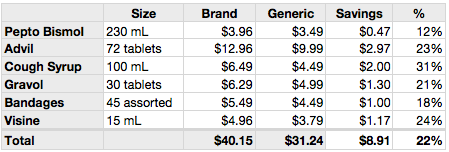
For my experiment I visited a Canadian chain called Superstore. Your local generic prices may be cheaper. Lucky you. 🙂
And my price check results for the whole sickly lot:
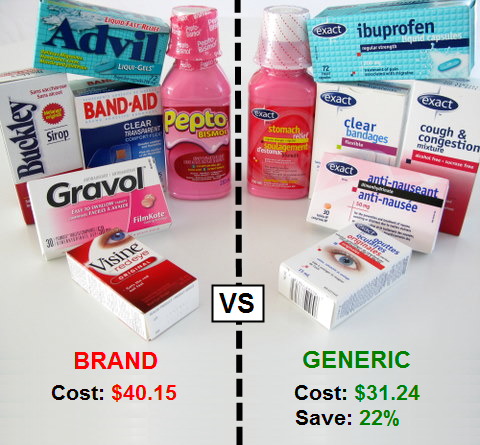
Bottom Line: Get your sick on and cure the common cold for 22% less by switching your entire medicine cabinet to generic over-the-counter drugs.
But how did the generic products compare to the big brand name superstars? I tasted, sampled, guzzled, dripped, and stuck every product on my list. Some generics are better deals than others.
1. Cough Syrup: Buckley’s Cough Mixture
I asked the fine people on the Squawkfox Facebook Page which generic product packed the biggest savings. No one guessed that generic brand Buckley’s would cough up the best bargain.
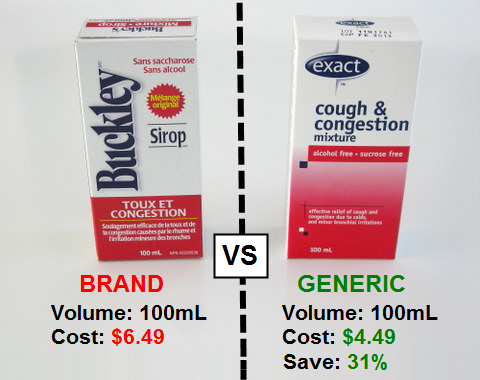
Bottom Line: It tastes awful, and it works for 31% less when you switch to generic Buckley’s cough syrup.
While both brands tasted terrible, the consistency and color were a little different. Buckley’s was milky, and the generic was a tad bit thicker, but neither tasted sweeter. Both products contain the same active and inactive ingredients.
Switch Tip: Because taste plays a major role for kids taking their cough medicine, it’s a good idea to compare the sweetness of each brand before making the switch.
2. Eye Drops: Visine
What to see some real savings?

Bottom Line: You’ll see clearly now for an eye popping 24% less with generic brand Visine eyedrops. Since both products contain the active ingredient tetrahydrozoline hydrochloride (0.5mg/mL), you’ll save a spectacular $1.17 per bottle by passing on the popular peeper brand.
Both products looked exactly the same to me.
3. Liquid Ibuprofen: Advil
Many people on the Squawkfox Facebook Page guessed that ibuprofen would be the best generic bargain. They guessed wrong, but these generic pain-killing pills do bring home stellar savings.
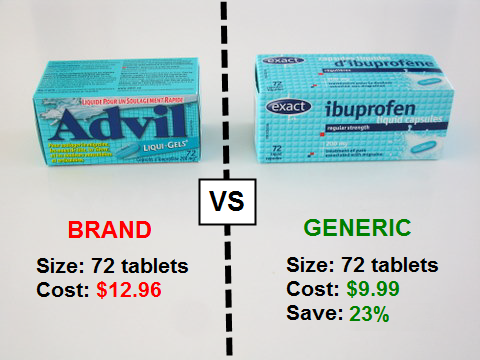
Bottom Line: Mend that migraine and save a mind-numbing $2.97 (that’s 23%) on a 72 tablet bottle of generic liquid ibuprofen.
The only time I’ve ever bought brand name Advil was for this article. Never again. Both products offer 200mg of ibuprofen per tablet.
4. Anti-Nauseant: Gravol
A good dose of dimenhydrinate — the active ingredient in Gravol — might right bad cases of motion sickness, nausea, and vomiting. But are you paying too much for relief?
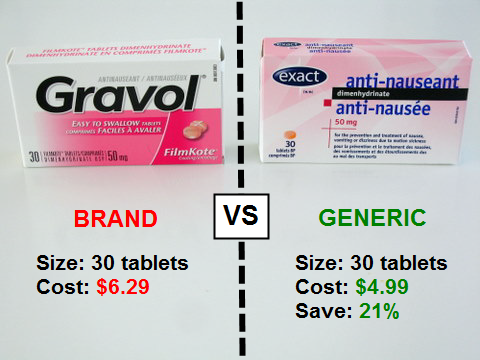
Bottom Line: Stop the spinning sensations for $1.30 (or 21%) less with 30 tablets of generic Gravol.
Tough pill to swallow? Generic dimenhydrinate tablets don’t come with Gravol’s trademarked ‘FilmKote’ coating, so those who prefer an easy-to-swallow tablet may benefit from buying the Gravol brand for $1.30 more.
5. Clear Bandages: Band-Aid
Runners, walkers, gardeners, clumsy cooks, and parents always need a first aid kit stocked with multiple sizes of bandages.
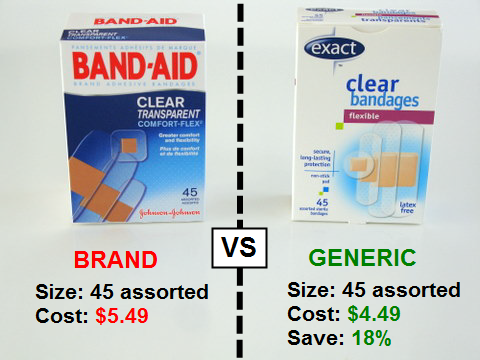
Bottom Line: Skinned knees and other boos-boos are covered for 18% less with a box of generic Band-Aid bandages.
The Band-Aid brand bandage boasts a tapered shape and a little more gauze. The generic bandage is a little stickier.
6. Stomach Relief: Pepto-Bismol
Got a little gut gurgle? Had too much frugal chicken and not enough honest exercise? A brighter pink potion is what the generic Pepto-Bismol buys you. A blind taste test (with my somewhat scientific family) reveals that both pink liquids taste the same (to us).
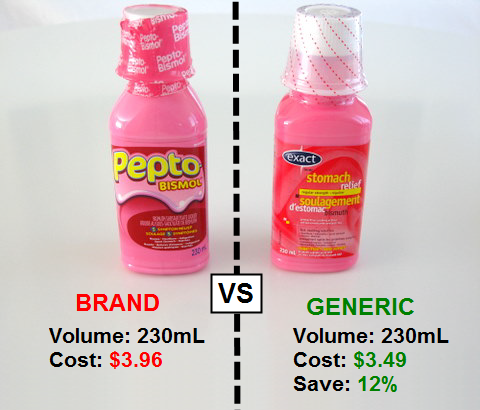
Bottom Line: Settle your upset stomach with a little 12% savings by guzzling from a 230mL bottle of generic Pepto-Bismol. Both products contain the active ingredient bismuth subsalicylate (17.6 mg/mL) to ease gut rot.
Switch Tip: Consider sizing up to the 480mL bottle of generic Pepto-Bismol to save even more moolah — 24% to be exact.
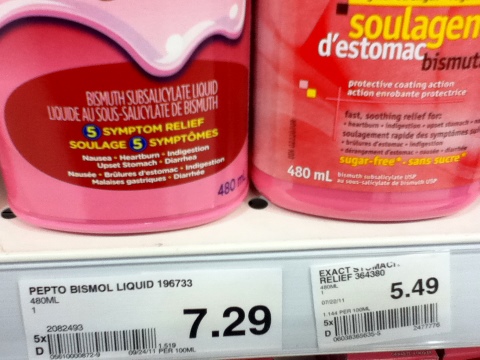
Buying in bulk can often save you money if it’s a product you need and use often.
So where am I going with this?
You don’t need to spend big bucks on brand name over-the-counter medications and remedies to get healthy and headache-free. Making the switch to generic drugs could save you up to 30% — that’s $360 per year for a family that spends $1,200 annually.
For more easy ways to save money, check out 50 Ways to Save $1,000 a Year.
Your Turn: What generic remedies do you buy? What brand name products are worth the additional dollars?
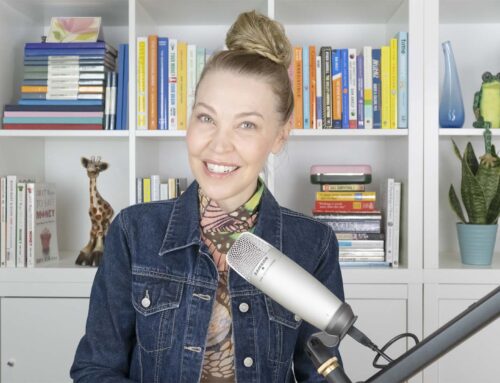

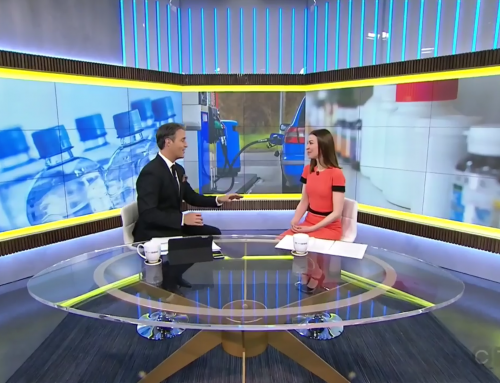

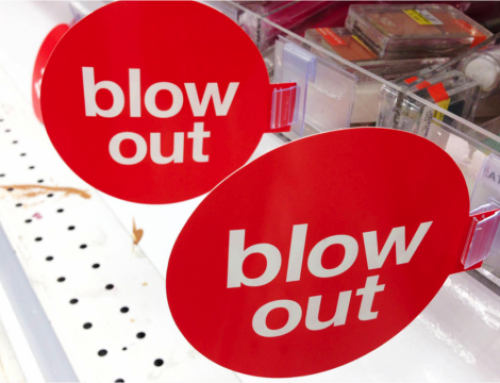
I have had ample opportunity to test advil versus other brand name headache tablets versus store brands, as my office’s drugs stash stocks ’em all, and lord knows that place has given me plenty of headaches over the last six years. I have found the off-brands to be okay! For nyquil, though, I want the real deal. When I want to be knocked unconscious for 8-10 hours I don’t care about saving the 20%.
I use a generic loratadine, brand name Claritin, for allergies. Works perfectly. I’m not sure how much exactly I’m saving, but if I buy the product at Target (best generic price I’ve seen) I save a lot. I also use generic ibuprofen … can’t imagine paying for Advil (unless it’s free after deal!). Thanks so much for doing this study.
I am wondering if anyone with tough migraines, who usually uses advil, also feels there is no difference with the generic. I have tried the generic and they seem ok for milder migraines. I have only found the advil migraine liqua gels really affective for the more painful ones. Any thoughts?
Hi Marissa: If you live in the USA or Canada then generic medications must be medicinally equivalent to the better known brand name product.
I’m actually surprised that the discount only averages 22%. I would have thought it to be much higher!
22% is probably something that can be easily overcome with a good sale and a manufacturer’s coupon. If you don’t have time for those shenanigans though – generic definitely sounds like the way to go!
I find that usually if I have a coupon and a sale, the brand name can be cheaper. When I need it NOW and there’s none in the stockpile, I always pick the generic brand.
You’re talking about over-the-counter drugs, I know, but I’ll add this cautionary note. I had terrible reactions to the ONE generic prescription drug I tried. Never, ever again. In fact, my pharmacist says only about 50 percent of people can even tolerate the generic that I tried. Check with a pharmacist before you try any generic drug products if you have questions or concerns.
I know to some this will sound silly, but sometimes the packaging on brand-name products is much more user-friendly than on generics. In particular, I tend to buy Dayquil/Nyquil instead of the generic because when I’m sick and want my meds, I don’t want to fight packaging. With Dayquil, I can tear into the pills by hand, no scissors necessary.
While this is useful comparison shopping, the whole business of OTC medication is questionable especially for the frugalistas among us. OTC medication is advertised and the manufacturers want us to buy their products. Advertising costs are built into the price we pay at the till. IMO we should be applying the same rules to the purchase of OTC medications as we do to any other product and that bottom line is:
DO I REALLY NEED THIS?
Apart from the “sticky plasters” AKA Bandaids and two very small (72 could last me a lifetime!) containers of OTC pain killers (ibuprofen and acetaminophen), I don’t buy those products just to have them on hand. When I need them (touch wood), I’m usually so sick that I haven’t the energy to make wise price comparisons!
My favourite frugal medicine is the Kirkland brand muscle relaxants. That’s Costco’s brand, for those unfamiliar with the name.
$3.99 for a bottle of 100. Right next to the Robax variety, which hits something like $24.99 for 40.
And for some reason, the Robax ones have never worked on one of my tension headaches, but the Kirkland ones do. Maybe the added stress from the cost? 😉
Hello,
fortunately (in my opinion) I live in a country where even OTC meds (excluding herbal stuff, nutritional supplements and very few meds) are sold only in pharmacies. Who is there for you if you buy meds at the supermarket?!
In Germany, generic drugs are medicinally the same as the brand names, as well, so I always go for the cheapest 😉
HOWEVER, I really want to stress what Pippa asks:
Do I really need this?
From a medical/ evidence-based standpoint, most of the OTC drugs for cold (I’m not talking about painkillers!) are useless (at best), if not harmful (e.g. some cough meds are – and this also applies to children!).
They do not make the cough better, the mucus thinner, the duration of the cold shorter or the number of complications fewer. Most don’t even make you feel better (at least, not better than what could be achieved through bedrest/ tea/ chicken soup/ someone caring for you).
So… I don’t buy any meds for the common cold that strikes so often during the autumn/ winter months! That’s the most frugal.
Nicely done! I think you are right about generic brands. Despite this fact you just pointed about, I know people will still buy well known brands.
My daughter has a very expensive prescription that is not covered by our health plan so I took the generic comparison to the next level. I took the prescription to various pharmacys in our area and asked for direct quotes. The differences were amazing! I am now saving $492 annually on just this one prescription. So worth the few minutes it took to go and ask
I guess I’m wondering why this is such big news, but perhaps I’m just naturally more frugal than a lot of people. The routine described above (compare active ingredients/compare price per dose/buy the cheap stuff) is so ingrained in my now I don’t even think about it.
And I agree with the poster above who does not keep her medicine cabinet fully stocked, but only buys what’s needed when it’s needed. Not only does it prevent wastage due to having the medication expire before it’s needed, it’s also a way to prevent accidental poisoning! The only thing I stock up are the meds I use daily/frequently, and even then no more than 1-3 months worth, depending on the meds.
I use generics for all of my OTC drugs and all of my prescriptions (7) except for 1, Synthroid. Once a person starts taking a thyroid replacement drug, *either* a generic brand or Synthroid, that person should stay with whatever she started with. I tried to switch from Synthroid to a generic after having taken Synthroid for 20 yrs. but my body could not metabolize the generic and I became very ill. Your body cannot switch from one to the other in this one instance.
All my other generics, for diabetes, heart disease, high blood pressure and allergies work just as well and save me tons of $. The same with all my OTC generics. If you have any doubts, ask your pharmacist. They’re founts of terrific info and usually love to help you.
One caveat about buying larger sizes on drugs – be aware of how often you are likely to use the drug between purchase date and expiry date. Sometimes you are better off buying smaller quantities than throwing out unused medicine or using it after its expiry date and risking nasty side effects.
i find generic otc or prescription meds are much cheaper and just as good. If you’re near a U.S. walmart the generics are even cheaper. $4 gets you 300 81mg aspirin compared to Rexall’s recent sale(?) of 120 81mg brand name aspirin for a really low $12.99.
The Superstore here usually has various OTC generics on sale every week.Early this summer I got 500 “Exact” 500mg gen aspirin there for less than 100 tylenol. With an expiry date of jun/13 it’s worth stocking up on. It’s always worth stopping in there for a look while on the way to frills/basics.Zellers also has good sales oocasionally This expiry date thing smacks of B.S. I really wonder especially since it’s the manufacturer telling you when to throw it out.(and unspoken but implied is “Now run out and buy some more!” Who hasn’t used something well past “the date” with no ill effects? Just sayin’
Best bargain… Don’t buy any of these, except maybe for bandages. Keep away from any kind of medicine.
@Stu, many drugs, both otc and prescription are just fine after their expiry date. Some will lose a bit or more effectiveness but some will kill you. Outdated tetracycline will destroy your kidneys, for instance, no kidding. It’s used for bacterial infections. The problem is knowing which one will be all right and which one won’t. With some drugs, it’s a Russian roulette.
While the active ingredients in generics may be required to be the same, they do not always work the same. Check out the website The People’s Pharmacy for details. There’d are documented problems with certain medications. Also, remember the issues with Chinese blood thinners? Counterfeit drugs? Lack of inspectors? Once a drug meets the approval process, it is rarely if ever tested again. Why do you think the generics can be made so cheaply? While many generics are fine, high quality, and work the same, blanket assumptions about value based on some federal description is a bit idealistic.
Laurie,I should have clarified the expiry comment. I was thinking more in terms of grocery items than drugs. My Bad!!!
Ah, I agree completely about the grocery items! I’ve got a pantry full of older stuff. My grocery store puts them on sale just before they expire and I can’t resist saving the $.
[…] This week Squawkfox investigates the cost of medicine with a Price Check Experiment: Are Generic Drugs Worth It? […]
You got me laughing with your “get your sick on and save.”
It’s true though!
I just got your book from the library and I love it, easy to read and full of great advice. I have been buying generic for years after asking my pharmacist about them. Pharmacists are a terrific source of info and most of them are happy to answer questions that can save you money.
Have you ever thought to talk to a pharmacist duh????? I am one and people BUY so much CRAP because they have been TOLD by advertisers to do this. NOBODY for example should EVER use a RED EYE product it is bad for your eyes!!!!!!!!!!! Think ASK and ponder if you really need drugs for anything before you buy!!!!!!!
Marissa, I’m with you! They may have the same amount of medicinal ingredients, but for a migraine, I have to have brand name Advil, the Exact brand, in particular, doesn’t get to the source of the pain quickly enough. Maybe the coating is thicker, or even denser?
I am with you Lisa! I knew I couldn’t be the only one that can only use brand name ibuprofen (Advil). When I use the generic brand, it doesn’t work fast enough or take away as much of the pain. I compared the labels of Advil and the generic brand I bought from Shopper’s Drug Mart and the inactive ingredients are slightly different (which is legaal in Canada in reference to the post).
I don’t really use that many other medications but generic brand anti-histamines work fine for me except the non-drowsy ones still make me drowsy (Wal-Mart brand). I think from these experiences I’d rather just buy brand name so I know the product will work. When it comes to my health their is no point buying a sub-par product just to save money.
Here in the U.S., the active ingredients have to be the same, but not the inactive ingredients. In fact, if medicine laws happen to be the same as food product laws, then it is illegal to get the exact same formula. (I think that’s true for medicine, and know it is true for food and drinks). If you happen to discover the exact formula to Dr. Pepper and start selling it, you are breaking the law even if you didn’t get it from an employee. For that reason, generic products ARE different from name brand. Usually they work about as well. But not always.
I have been on the same allergy medicine for about 4 years now, and have tried the generic from every store I shop at, based on where I was when I needed more each time. In this time I have learned that that pill from certain stores does almost nothing, and at other stores it only works half as well as usual. Still other stores I can save money by buying the generic, (without any loss in effectiveness) so I happily do so.
In conclusion: If I am just trying something out for the first time, I usually buy the brand name. If I stay on it for a while, I start experimenting with the generics to save money — usually I try the generic from a store that I’ve had positive results from in the past.
Good article. I also found that Costco’s no-name bank pain medication works WAY better than the name brand one and is WAY WAY cheaper.
Can anyone tell me why you cannot buy generic extra strength (500 mg) asprin. My doctor told me to take 1000mg asprin for migraines. Tylenol and Advil do not work for me. I can’t seem to find any generics for the asprin in an extra strength dose. Does Bayer have a patent on this? Their asprin is very expensive. I tried cutting regular strength down to equal 1000 mg’s but there is no way to know if I’m getting the 1000 mg strength for sure so I stopped doing that.
I would like to mention Homeopathic medicine. Homeopathic is not “that herbal medicine stuff”! It does not work at all!
Homeopathic medicine is where they take something and dilute it down to the point it is physically impossible for that “medicine” to be in there. Also sine they believe that “like cures like” you can find dangerous substances like poison ivy and arsenic in their ingredients list hidden under a fancy name. Though of course you’ll never actually get them even if you down the whole bottle, or two, or ten.
Homeopathic medicines are a placebo at best for the price of actual medicine! Do not buy them!